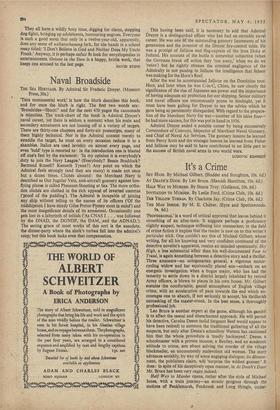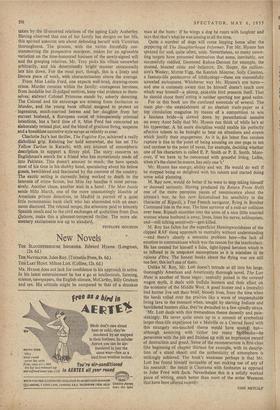It's a Crime
'PROFESSIONAL' is a word of critical approval that leaves behind it something of an after-taste. It suggests perhaps a proficiency slightly suspect, technique stiffening into mannerism; in the field of crime fiction it implies that the reader is now on to this writer's particular trick. One couldn't say this of Michael Gilbert, whose writing, for all his knowing and very confident command of the detective novelist's apparatus, retains an unjaded spontaneity. Sky High, a less substantial affair than his well-documented Fear to Tread, is again something between a detective story and a thriller. Three amateurs—an octogenarian general, a vigorous motor- cycling widow and her equivocally placed son—embark on an energetic investigation when a bogus major, who has had the temerity to settle down in a district largely inhabited by retired Army officers, is blown to pieces in his own house. Mr. Gilbert sustains the comfortable, genial atmosphere of English village crime, with an acceleration of pace towards the end which en- courages one to absorb, if not seriously to accept, his thrillerish unmasking of the master-crook. In the best sense, a thoroughly professional job.
Leo Bruce is another expert at the game, although his gambit is to affect the casual and disenchanted approach. He will permit his detective, Carolus Deene (solid Sergeant Beef would appear to have been retired) to summon the traditional gathering of all the suspects, but only after Deene's schoolboy Watson has cautioned him that the whole procedure is 'madly hackneyed.' Deene, a schoolmaster with a private income, a Bentley, and an academic attitude to crime, sets about solving the murder of the village blackmailer, an uncommonly malevolent old woman. The story advances amiably, by way of some engaging dialogue; its dénoue- ment, the publishers claim, will 'surprise the wildest guesser.' It does: in spite of his deceptively open manner, in At Death's Door Mr. Bruce has been very cagey indeed.
Half Way to Murder opens, rather after the style of Michael Innes, with a train journey—an erratic progress through the stations of Penklemarsh, Foulcreek and Long Shingle, under-
taken by the ill-assorted relations of the ageing Lady Assherley. Having observed that one of her family has designs on her life, this spirited autocrat sets about defending herself with Victorian thoroughness. The process, with the victim forcefully out- manoeuvring the prospective murderer, makes for an agreeable variation on the time-honoured business of the newly-signed will and the grasping relatives. Mr. Troy picks his villain somewhat arbitrarily, and his determinedly bright manner occasionally lets him down. For the most part, though, this is a lively and literate piece of work, with characterisation above the average.
From Miss Leslie Ford, one expects well-bred, drawing-room crime. Murder remains within the family; courageous heroines, from laudable but ill-judged motives, keep vital evidence to them- selves; stalwart Colonel Primrose stands by, soberly detecting. The Colonel and his entourage are missing from Invitation to Murder, and the young bank official assigned to protect an ingenuous, much-married heiress and her daughter from her current husband, a European count of transparently criminal intentions, has a hard time of it. Miss Ford has concocted an elaborately twisted plot; and the blend of gracious living, suspense and a breathless narrative style serves as reliably as ever.
Charlotte Jay's last thriller, The Fugitive Eye, achieved a really diabolical grip. Relaxing her hold somewhat, she has set The Yellow Turban in Karachi, with any amount of atmospheric description to support a flimsy plot. The story concerns an Englishman's search for a friend who has mysteriously made off into Pakistan. This doesn't amount to much; the hero spends most of his time in his shabby hotel, speculating about his fellow guests, bewildered and fascinated by the customs of the country. The exotic setting is currently being worked to death in the interests of crime fiction, but Miss Jay handles it most persua- sively. Another chase, another wait in a hotel : The Man Inside sends Milo March, one of the more unassumingly likeable of American private detectives, to Madrid in pursuit of a quiet little monomaniac bank clerk who has absconded with an enor- mous diamond. The relaxed tempo, the attention paid to leisurely Spanish meals and to the civil exchanges of qudtations from Don Quixote, make this a pleasant-tempered thriller. The more ele- mentary excitements are up to standard.
PENELOPE HOUSTON











































 Previous page
Previous page